The Play Party in Idaho by Leona Nessly Ball
The Journal of American Folklore, Vol. 44, No. 171 (Jan. - Mar., 1931), pp. 1-26
THE PLAY PARTY IN IDAHO [1]
LEONA NESSLY BALL
[1] I wish gratefully to acknowledge my deep indebtedness to my instructor, Dr. George Morey Miller of the University of Idaho, whose enthusiasm for folklore first interested me in the subject, and whose assistance and encouragement is responsible for my collection of play-party songs. I wish also to record my gratitude to the following, who have added greatly to my knowledge of play-parties: Mrs. Robert Cay, Mrs. Frank O'Brien, Mrs. J. P. Wedin, Mrs. J. A. Tertelling, Mrs. Robert McGill, Mrs. Maud Hunter, Mrs. Ira Dooley, Mrs. Hector Shoop and Mrs. Henry Gauss. I am also grateful to the members of the numerous rural districts who have made me welcome at these play-parties and who have assisted me in securing copies of the verses.]
The play party is a survival of our grandfathers' days, which today is found only in those isolated districts that are more or less separated, very often by reason of their physical geography, from their more thickly settled neighbors. Like the Celts in early England, the play party has been pushed back, foot by foot, across the entire country, until today it has taken its final stand in certain mountain fastnesses where its enemy, sophistication, cannot further pursue it. The play party came to America from England with the middle classes, and slowly marched with our pioneers to all the far corners of our country. Herbert Quick, in his book Vandemarck's Folly, tells of it in Iowa two generations ago; Dr. George Morey Miller in his book called The Dramatic Element in the Popular Ballad, tells of its presence in the state of Washington some twenty-nine years ago; Leah Jackson Wolford in her book The Play Party in Indiana describes the play party most fully as she and her parents have known it in that state, and the Journal of American Folk-Lore has published numerous studies relating to various characteristics pertaining to this form of amusement as it has appeared in different communities.
Today in Northern Idaho those conditions exist which are most conducive to 'the survival of the play party, and here it is now a flourishing fashion in rural districts. The country is largely mountainous, and travel is cut to a minimum by the deep canyons, the dangerous grades, and the mountain streams. During the long summer evenings when the roads are good, the country people may drive to town to attend the movies, or ride to a neighbor's home to sit on the porch and visit for an hour or two; but there will be no social gatherings of any kind in these months which will include more than a very small portion of the entire group. Here and there in the district a family will drive into town on Sunday mornings to attend church services, but this is the exception and not the rule. In the part of Idaho that I know best, there are no Ladies' Aids, no Young People's Societies, no Women's Clubs, nor Men's Smokers. Isolation is the rule in these mountain communities.
The fall months bring with them, however, one form of social gathering which is distinctly popular with the entire group in the isolated districts. This is the Public Sale. Each year a farmer here or there will have reached that time of life and that state of affluence when he can sell his belongings and go to California; others who have attained neither age nor affluence will be selling out to go to Canada and start life anew, and still others will be selling out in order to live nearer relatives, or to try truck farming, or to move to town. Each of these people in turn will have a sale, and serve a free lunch at noon; and to each of these sales the neighbors will come, generally with all the family, and spend the entire day. The farmer's goods will be sold of course, (the valuable things going for mere songs and the worthless articles bringing the average up handsomely, as is always the case), but this buying and selling will, after all, be but a minor aspect of the affair. The really important phase will be the social contact which this gathering provides.
The movies and visits of summer, then, and the public sales of the fall afford the opportunities for sociability that gregarious man requires, but what entertainment will be provided for the winter months? Always with the rains and the snows of winter comes the play party, the most important social function of the year. To one who has lived all of his pastyears in the city, the play party affords a great awakening. It was about nine years ago that I attended the first play party I had ever seen, and caught my first glimpse of the social environment of pioneer days. Here I learned for the first time all the words of many songs, fragments of which I had heard from my parents for years, and here it was that I first saw these songs in their natural habitat. Here it was that I first heard Skip to my Lou through all its eighteen verses; here it was that I learned that Old John Brown Had a Little Indian belonged to a dance step, and not to the knee-trotting game with which it was connected in my early childhood; and here it was that I heard We've Got a Pig in the Parlor fade gently out into Swing your Left Hand Lady Round and We'll All Promenade. Since that time I have attended many of these parties, but they have never grown an old story. Often after I have thought I knew every one of the repertoire numbers, the crowd will form a ring, seemingly without a word of agreement, and spontaneously swing into a play party song which I have never heard them sing before.
I have never heard the play party referred to as such by any of those who participate in it. If the play party is given in a private home, which is very rare indeed, then it is merely called a party. It it is given in the school house it follows a school program and the entire festivities of the evening are grouped together under the cognomen "school entertainment". The first play party of the year will come on that Friday evening which is nearest to Hallowe'en. The teacher will start the machinery by assigning "pieces" for each of the pupils to speak, and as the children practise their verses the word floats over the countryside that on the appointed evening the Mountain Prospect School will give an entertainment. The country schools that I know average about twelve pupils each, and these youngsters are the "moccasin telegraph" by which the coming play party is announced. That is, it is announced merely by connotation. The pieces will be rehearsed to any who will listen; the one act play which will follow the pieces will be grandly enlarged upon to any one who cares to hear. The play will be liberally sprinkled with the well known neighborhood jests, and these selections of humor will become familiar to everyone, far and near, long before the program is given. But the play party itself seems never to come out into open conversation. Of the ballads Professor G. L. Kittredge has said: "As civilization advanced, they were banished from polite society, but they lived on among the humble, among the shepherds and ploughboys and 'the spinsters and knitters in the sun,' until even these became too sophisticated to care for them, and they were heard no more." The play party has now, too, been driven from polite society, and it lives on only in those mountain nooks where sophistication has not intruded.
Perhaps it is the impending arrival of this enemy that keeps the play party in such retirement as it maintains. Perhaps it is merely shy in daylight. Whatever the reason, it remains closely hidden and secure until the proper setting for it has been prepared. Then the play party comes into its own. For three or four hours it will emerge from its seclusion, and pretend the world is young again, and that folk have gathered to do it honor. It will be alive and boisterous; it will revel in shouting and singing and stamping, and it will reach a peak of mad merriment and then suddenly come to an end. The next day it will be again completely disguised under the all-inclusive name "school entertainment". With the announcement that such an entertainment will be given, as I have said, all the wheels in the social machinery of the district will start into motion. Young and old will turn at once to thoughts of raiment, and the former will unite in demanding new outfits for the season's opening affair. The latter will content themselves with airing and pressing their best apparel, and they will go about familiar tasks humming or whistling certain well known play party airs. The young lady of the family will hunt out her freckle cream and spend hours in beautifying her hands, while the young man will pump and carry and heat the tubs of water for the baths without one word of complaint. The children will stumble blindly about, mumbling studiously at their pieces, endeavoring by this means to escape the greatest possible number of chores. The phone will be ringing more or less continuously, and each mother in the district will stand for hours with receiver to ear, attempting to solve the problem of what refreshments she will take to the party. An ingenious mother in this district will train her smallest child to hold the receiver for her while she sits beneath the phone calmly paring potatoes, yet never missing a word of the discussion - even rising at times to interpolate a suggestion here and there where it will do the most good - as many an honest family can testify. There is never any conception of privacy about the rural lines. As many as twenty women may be engaged in a discussion at one time, each offering beneficial advice, and with these facilities the arrangements are soon made. Certain families will provide the sandwiches for all, as many as six kinds being decided upon; others will bring cakes for the crowd - light cakes and dark cakes, loaf cakes and layer cakes; others will bring the salads, which will consist, if the roads to town are in bad condition, of any relish from sweet pickles to chow-chow; and still others will provide the coffee, sugar, and cream. The cook wagon outfit nearest the school will be asked to supply all the dishes and the mammoth coffee-pots and dish-pans. Mother will thrust a folded dishtowel into her coat pocket and will probably have to sacrifice it for a dishrag which no one else thought to bring.
At last the evening arrives and everyone far and near goes to the brilliantly lighted country school house. There are absolutely no restrictions as to eligibility. Anyone in the Mountain Prospect district may attend, or anyone from any other district, or anyone from no district at all. Young people from town will drive out, city high school students will attend, and perhaps strangers who have come from a distance, and everyone will be made welcome. The wealthiest family in the district will rub elbows with the poorest, and the latter will have just as good a time as the former. The school house will be too crowded, of course; it always is. But games are possible despite the crowding, and no one seems to mind in the least. Even the children who have to pay for the crowding by having to sit quietly in the piled-up seats against a far wall after the play party begins, will take it good-naturedly, and watch the crowd contentedly until they fall asleep.
At the commencement of the party however, the seats are found standing correctly in their orderly rows, and only the initiate will realize that they are not permanent fixtures. There is nothing whatever in this very proper school house to remind one of a dance hall. It is far more like a theater, for, across the upper end, cutting off a space perhaps six feet deep by eighteen feet wide, will be strung a gayly colored calico curtain. From behind the curtain will come worried exclamations, giggles, chords from a concealed organ, all interspersed with constant admonitions to "Shhhhh!" from the sorely beset teacher. In the upper corner of the room will be several long tables heavily laden with market baskets of all shapes and sizes, all alike heaped high and rounded over with spotless cloths, mingled with two-quart fruit jars full of all kinds of salads, sweating cream cans, and leaning tower effects worked out in plates. The atmosphere will be weighted down with suppressed excitement and an odor of ground coffee.
As for the program itself, it will be the usual school exercise of "speakin' pieces", and these will vary from the four line selection lisped blushingly by the smallest of first graders, to the "Address of Logan", declaimed loudly and feelingly by the high collared young gentleman in the eighth grade. The sympathies of most of the audience are with the former, whereas my own are always with the latter; he has so many things to contend with. His boots are absolutely sure to squeak horribly with every appalling step he has to take; his collar will either threaten to choke him to death or will give up the endeavor with a loud pop and a flying button, and who shall say which is worse? His friends will always torment him with taunting "Hey, Bills," and his younger brothers and sisters will inevitably call out something which will disgrace him for years to come. And finally, it is always on this trying occasion that his voice will do its first terrifying breaking. It may have been a perfectly trustworthy organ for fifteen years, and come to be regarded with the utmost confidence, but inevitably it wrecks its possessor on some occasion like the play party. It could have broken at a hundred other times just as well, and caused him no distress whatever, but with fiendish ingenuity it must happen in the middle of Logan. As a result the unfortunate possessor of the break will have one or two fights outside in the autumn darkness before the evening is over, and perhaps half a dozen more within the next two weeks of school, before he regains any portion of his lost prestige. Yes, my sympathies are decidedly with the eighth grader.
There will be single recitations, and there will be dialogues; there will be solos, and quartettes, and chorouses, before the curtain is haltingly drawn together amid the applause of the audience. Then it will almost immediately be swished open again on the play. The plays of the cities always face two possibilities: they may be successes or they may be failures. This is never true in our rural communities, for here the play is always an amazing success. The act as it left the author's hands bears no relation whatever to the act given in this country school house. The teacher, always a Normal graduate, or a university junior-to-be next fall, will supply the one-act play which her pupils will act in such a way that the author himself would never recognize it. This is because in rehearsing there will be added here and there the many jests on the best known members of the community, and so little by little the drama is created by the school, until in the end the play emerges, not as an individual composition, but as a communal development. The twenty-five dollars paid for the privilege of giving the play would seem entirely wasted.
Nearly always the act will be a society play which the teacher saw given in her university. To be just right it should have a London setting, but one from New York or Boston will do in case of necessity. This is because the incongruity at once sets the audience off into gales of laughter, and within the first ten minutes the spell is completely woven. There must be a lord, or a world famed genius, as one of the leads in the production and a beautiful heiress is always an essential. This is a trying part, for many of the dramas have a heroine who smokes and even cubebs are a trial to the novice. The organ and a few borrowed easy chairs will indicate anything from the duke's castle to the House of Lords. Both setting and cast enhance the delight of hearing a member of parliament, for instance, tell at Lady Cardigan's ball the tale of Simmy Ransome's cow that is named Dr. Mary Walker on account of her unfortunate fondness for trousers, she having consumed as many as three pairs in one forenoon. It is always a mystery how the play ever reaches an ending, so often does it have to stand and wait wooden-faced (at which these children soon become adept) for the laughter to die down; but come to an end it always does, and that rarely later than nine-thirty. At its conclusion the teacher announces that "this ends our little program, and we thank you one and all for your kind attention." To all appearances the evening has come to an end.
But the teacher no sooner backs, bowing, through the curtains, than the audience rises as a single individual, and for a few moments bedlam reigns. The women and children retreat to the safety of the cloak-room. The men grab the rows of seats, and, row by row, they are carried to the most out-of-the-way wall and stacked as high as can be reached. The organ will be rolled out into the entry, and the tables arranged so as to take up the smallest possible amount of room. Within a bare five minutes the last protesting youngster is captured and wigglingly thrust into his particular niche in the layers of the desks, and the ring at once forms. Perhaps the first game will be Two Young Couples Skating Went. If the crowd is very large there may be four, or even six couples swinging at once in the center, each individual apparently bearing a charmed life, for I have never known of an accident. The lines are sung with a swing that only folk melodies have, and a more joyous game than those of the play party has never been known. There is so much repetition that any newcomer can at once learn the words and the tune:
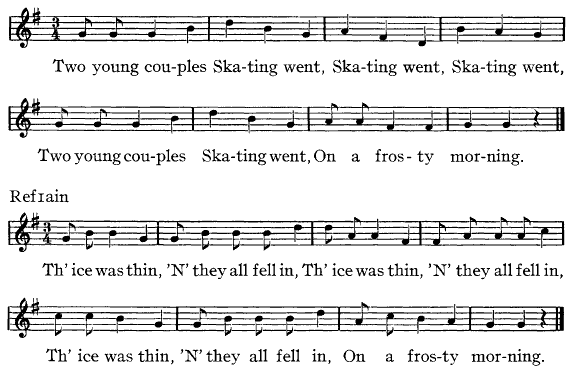
Two more couples to pull them out,
Two more couples to pull them out,
Two more couples to pull them out,
On a frosty morning.
In other variants there were three old maids who a-sliding went, and were pulled out by three old bachelors, who then fell in and were rescued by the old maids, but the version given above is the one with which I am most familiar. This game will be played until the majority has been chosen in and ejected from the center, and then perhaps the crowd swings at once into the following favorite:

1. There's a Light in the Window.
There's a light in the window, there's a light in the
win-dow, there's a light in the win - dow for me.
2. There is somebody waiting,
There is somebody waiting,
There is somebody waiting,
For me.
3. Choose the two, leave the other,
Choose the two, leave the other,
Choose the two, leave the other,
For me.
4. Swing the one, leave the other,
Swing the one, leave the other,
Swing the one, leave the other,
For me.
5. Now the story it is told,
You are left out in the cold,
And there's somebody waiting,
For me.
This is another and very short game:
I sent my little jug to town,
I sent my little jug to town,
I sent my little jug to town,
O lee, 0 lee, aye.
It came back with a bounce around,
It came back with a bounce around,
It came back with a bounce around,
O lee, 0 lee, aye.
Often this is followed by the game known as General Price, in which the women form the inner ring and the men the outer. The directions explain many of the movements:

[General Price, he made a raid, made a raid, made a raid,
Gener- al Price he made a raid and lost full many a Sol-dier.]
Turn back boys, go sailing away,
Turn back boys, go sailing away,
Turn back boys, go sailing away,
And choose for you a partner.
Turn back girls, go sailing away,
Turn back girls, go sailing away,
Turn back girls, go sailing away,
And choose for you a partner.
After a number of circle games have been played either Weevily Wheat or The Virginia Reel will be played, since they are both long-ways games and relieve the monotony. In these, two partners are chosen and the number is definitely limited. The Virginia Reel appears in this part of the country as follows:
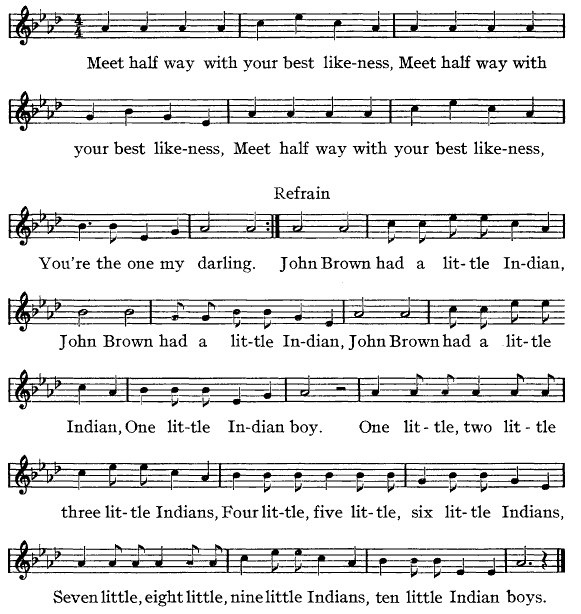
[Meet half way with your best like-ness, Meet half way with
your best like-ness, Meet half way with your best like-ness,
You're the one my darling. Refrain: John Brown had a lit- tle In-dian,
John Brown had a lit-tle In-dian, John Brown had a lit- tle
Indian, One lit-tle In-dian boy. One lit - tle, two lit - tle
three lit- tle Indians, Four lit-tle, five lit- tie, six lit- tle Indians,
Seven little, eight little, nine little Indians, ten little Indian boys.]
2. Do si do with your best likeness,
Do si do with your best likeness,
Do si do with your best likeness,
For you're the one, my darling.
3. Right hand swing with your best likeness,
Right hand swing with your best likeness,
Right hand swing with your best likeness,
For you're the one, my darling.
4. Left hand swing with your best likeness,
Left hand swing with your best likeness,
Left hand swing with your best likeness,
For you're the one, my darling.
5. One big swing with your best likeness,
One big swing with your best likeness,
One big swing with your best likeness,
For you're the one, my darling.
No game is ever more popular than the Reel and none is ever more exciting. The time grows faster and faster until it is an adept indeed who can hasten his action enough to keep up with the words. The elders will never indulge in this game, for it is too risky for life and limb; the eldery men and women frequently refer to the time when they "could toe the Virginia Reel with the best of them." For the refrain, to which the swinging is done, the crowd sings Old John Brown Had a Little Indian.
At the end every one of the couples must go under the arch made by the end couple, and it frequently happens that the six footer must slide gracefully under an arch less than five feet high, for the school children always participate in this favorite. More round games follow: Hey Jim Along, Jim Along Josie, Skip to my Lou, We've Got a Pig in the Parlor, Here We Stand All in a Ring, We're Marching Round the Levee, There's Four in a Boat and the Tides Roll High, Happy is the Miller Boy, Buffalo Girls Ain't You Coming Out Tonight, Chasing the Buffalo, Poor Old Chimney Sweeper, Oh, Sister Phoebe, The Old Brass Wagon, The Needle's Eye, Queen Anne, Queen Anne She Sat in the Sun, The Girl I Left Behind Me, Captain Jinks of the Horse Marines, King William Was King James's Son, as well as a number of others. In this last game I find four versions of the first verse, and all the others are identical. The variants are as follows:
1. King William was King James's son
Around the river race he run.
Upon his breast he wore a star
Pointing to the ocean far.
2. King William was King James's son
Many the races he has won
Upon his breast he wore a star
Like the points of the compass are.
3. King William was King James's son
Always the royal race he run
Upon his breast he wore a star
Like the points of a diamond are.
4. King William was King James's son
Many the races he has run
Upon his breast he wears a star
Pointing to his lands afar.
The other verses are all as follows:
Then choose to the east, and choose to the west,
Choose the one you love the best,
If she's not here to take her part
Choose another with all your heart.
Down on this carpet you must kneel
As sure as the grass grows in the field,
Salute your bride and kiss her sweet,
Then you may rise upon your feet.
Now you are married you must be good
Go split your wife some kindling wood
Split it fine and carry it in,
Then she will let you kiss her again.
These are a few more examples of the round game:
CINCINNATI GIRLS
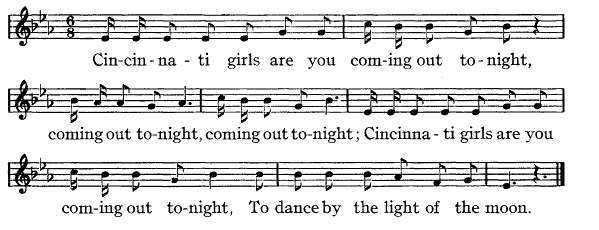
[Cin-cin- na - ti girls are you com-ing out to - night,
coming out to-night, coming out to-night; Cincinna - ti girls are you
com-ing out to-night, To dance by the light of the moon.]
2. We'll dance all through the night
Till it's broad daylight
Till it's broad daylight,
Till it's broad daylight;
We'll dance all through the night
Till it's broad daylight,
Dancing by the light of the moon.
MY FATHER AND MOTHER WERE IRISH

[Refrain: My father and mother were I - rish, my father and mother were
I - rish, my father and mother were I - rish, and I am Irish too.}
2. We fed the pig in the parlor,
We fed the pig in the parlor,
We fed the pig in the parlor,
For he was Irish, too.
3. We've got a new pig in the parlor,
We've got a new pig in the parlor,
We've got a new pig in the parlor,
And it is Irish, too.
Refrain:
4. Your right hand to your pardner,
Your left hand to your neighbor
Your right hand to your pardner,
And we'll all promenade.
MARCHING ROUND THE LEVEE

[We're marching round the levee, We're marching round the levee, We're
marching round the le - vee, For we have won the day.]
2. Go in and out the windows, : 3 times
For we have gained the day.
3. Go forth and choose your lover, : 3 times
For we have gained the day.
4. I kneel because I love you, : 3 times
For we have gained the day.
5. I measure my love to show you, : 3 times
For we have gained the day.
6. One kiss before I leave you,: 3 times
For we have gained the day.
THE OLD BRASS WAGON
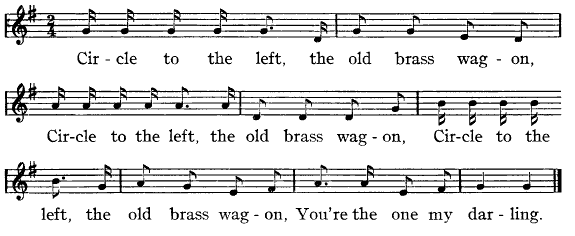
[Cir - cle to the left, the old brass wag - on,
Cir-cle to the left, t the old brass wag - on, the
left, the old brass wag - on, You're the one my dar - ling.]
2. Swing and swing the old brass wagon,: 3 times.
You're the one, my darling.
3. Promenade home with the old brass wagon,: 3 times.
You're the one, my darling.
4. Wheel and turn that old brass wagon,: 3 times.
You're the one, my darling.
OH SISTER PHOEBE
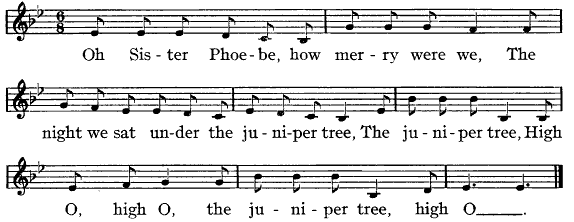
[Oh Sis - ter Phoe-be, how mer - ry were we, The
night we sat un-der the ju - ni-per tree, The ju - ni- per tree, High
O, high 0, the ju - ni - per tree, high O.]
2. Keep your hat on your head,
It will keep your head warm,
And take one sweet kiss,
It will do you no harm.
3. It will do you no harm,
But a great deal of good,
And so take another,
While it's all understood.
CAPTAIN JINKS OF THE HORSE MARINES
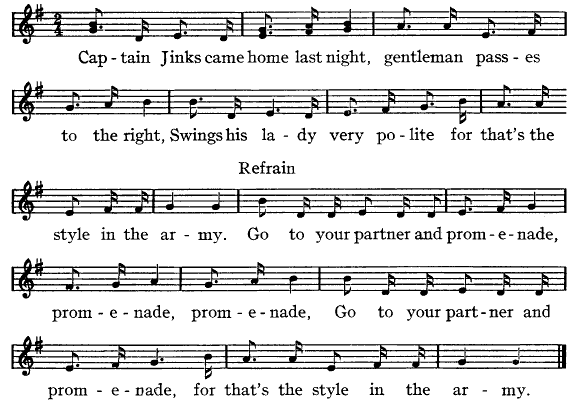
Cap - tain Jinks came home last night, gentleman pass - es
to the right, Swings his la - dy very po - lite for that's the
style in the ar - my.
Refrain: Go to your partner and prom - e - nade,
prom - e - nade, prom - e - nade, Go to your part-ner and
prom - e - nade, for that's the style in the ar - my.]
2. When he was young his mama cried,
His mama cried, his mama cried,
When he was young his mama cried,
"You're not cut out for the army."
3. But he's Captain Jinks of the horse marines,
He feeds his horse on corn and beans,
Although it's way beyond his means,
For that's the style in the army.
ROWSER'S

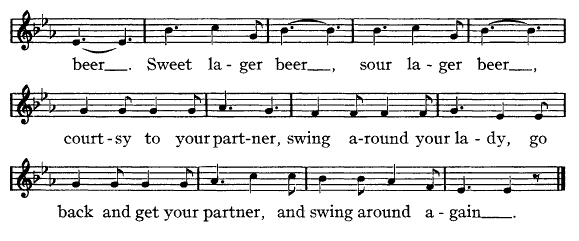
[We'll all go down to Row-ser's, to Row-ser's, to
Rowser's, We'll all go down to Rowser's, to get some la - ger
beer__. Sweet la - ger beer__, sour la - ger beer-,
court - sy to your part-ner, swing a-round your la - dy, go
back and get your partner, and swing around a - gain.]
THE MILLER BOY
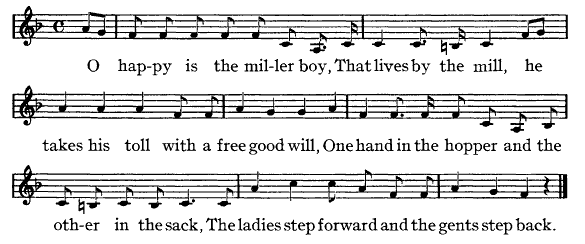
[O hap-py is the mil-ler boy, That lives by the mill, he
takes his toll with a free good will, One hand in the hopper and the
oth-er in the sack, The ladies step forward and the gents step back.]
2. Happy is the miller boy who lives by himself,
While his wheel turns round he is adding to his wealth,
It's one hand in the hopper and the other in the sack,
And the ladies step forward, and the gents step back.
THE GIRL I LEFT BEHIND ME
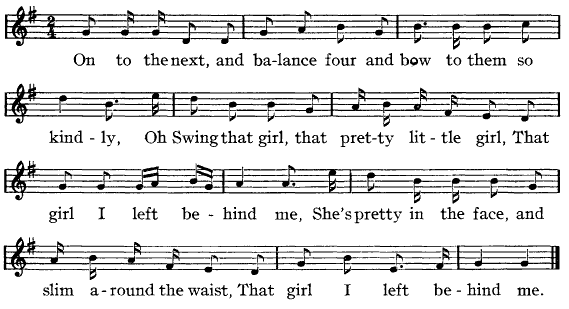
[On to the next, and ba-lance four and bow to them so
kind - ly, Oh Swingthat girl, that pret-ty lit - tle girl, That
girl I left be - hind me, She's pretty in the face, and
slim a - round the waist, That girl I left be - hind me.]
OLD DAN TUCKER
1. Old Dan Tucker was a queer old soul,
He washed his face in the sugar bowl,
He combed his hair with a wagon wheel,
And died with the tooth ache in his heel.
2. Out of the way for Old Dan Tucker,
He's too late to get his supper,
Supper's over and the dishes washed,
And nothing's left but a piece of squash.
3. Old Dan Tucker goes to town,
And swings the ladies all around,
First to the east and then to the west,
And then to the one he loves the best.
SHOOT THE BUFFALO
Rise ye up, my dearest dear,
And present to me your hand,
And we'll march away together,
To a far and distant land: 3 times.
And we'll march away together
To a far and better land.
Where the hawk chased the buzzard,
And the buzzard stubbed his toe,
And we'll rally through the corn-brake,
And shoot the buffalo
Then will come another long-ways game to finish up the list, most likely Weevily Wheat, although The Needle's Eye is an arch game and may break the monotony of so many ring games. Weevily Wheat is sung
here as follows:
WEEVILY WHEAT
1. Up the river, skip together,
In the morning early,
Join with me your heart and hand,
For I do love you dearly.
Refrain: Oh, Charley he's a nice young man,
Charley he's a dandy,
Charley hugs and kisses the girls,
For he knows they taste like candy.
2. I want some of your weevily wheat,
I want some of your barley,
I want some of your weevily wheat,
To make a cake for Charley.
2. Charley, barley, wheat, and rye,
Kissed the girls and made them cry,
I'll jump over your weevily wheat,
And you'll jump over the barley.
4. I'll step her to your weevily wheat,
I'll step her to your barley,
I'll step her to your weevily wheat,
I'll step away to Charley.
5. The higher up the cherry tree,
The finer grow the cherries,
The more you hug and kiss the girls,
The sooner will they marry.
6. It's left hand round the weevily wheat,
It's left hand round your barley.
It's left hand round your weevily wheat.
To make a cake for Charley.
7. It's right hand round your weevily wheat,
It's right hand round your barley.
It's right hand round your weevily wheat,
To make a cake for Charley.
8. It's both hands round your weevily wheat,
It's both hands round your barley.
It's both hands round your weevily wheat,
To make a cake for Charley.
9. It's swing, yes, swing your weevily wheat,
It's swing, yes, swing your barley.
It's swing, yes, swing your weevily wheat,
To make a cake for Charley.
10. Come down this way with your weevily wheat,
Come down this way with your barley,
Come down this way with your weevily wheat,
To make a cake for Charley.
The refrain is sung after each verse of the song, and the steps are exactly those of the Virginia Reel. Here is the tune of the refrain:

[Oh Charley he's a nice young man, Oh Charley he's a dan-dy
Char-ley hugs and kisses the girls, Whenever it comes handy.]
This is The Needle's Eye which may take the place of the Virginia Reel:

[The needle's eye, it doth supply the thread that runs so true - and
many a lass have I let pass, Because I wanted you.]
Refrain: And they bow so neat
And they kiss so sweet,
We do intend before we end
To have this couple meet.
2. The needle's eye, it doth supply
The thread that runs so true,
And many a lass have I let pass
Because I wanted you.
In all of the games, as many as can crowd into the ring regardless of sex, age, or previous condition. Because of this promiscuity, the directions for kissing are not obeyed, a swing generally being substituted; we swing where the directions say to kiss, and no one thinks of making the words fit better the setting and actions. New words are never originated to fit the songs. Here in Idaho, we sing blandly albout Buffalo Girls, about Topsy "here in Alabam", about Cincinnati Girls; there is a surprising lack of local modifications, as shown in the two songs which follow- Marching Round the Levee and Old Quebec:
MARCHING ROUND THE LEVEE
We're marching round the levee (3 times)
For we have gained the day.
Go in and out the window (3 times)
For we have gained the day.
Go forth and choose your lover (3 times)
For we have gained the day.
I kneel because I love you (3 times)
For we have gained the day.
One kiss before I leave you (3 times)
For we have gained the day.
OLD QUEBEC
We're marching down to old Quebec,
The drums are loudly beating,
The American boys have won the day,
And the British are retreating.
The war's all over, and we'll turn back,
To the place where we first started,
And we'll open up the ring, and let this couple in,
To relieve (release ?) the poor broken hearted.
Chorus: Oh dear -, How I love you,
Who in the world could I ever place above you?
Heart and hand I'll freely give you,
Then I must kiss you and bid you adieu.
Because of this lack of change, we find the play parties living in countless small pockets of the hills all over the United States, all practically the same, and all alike ignorant of their beginnings. However, Southerners say that there is a distinct Arkansas and Missouri style in play-parties; that no state in the union puts the vim and verve into these pastimes that Arkansas does. Missouri does fairly well, but in Arkansas, a southern friend tells me, they don't consider it dancing unless it sounds like fire-crackers from the popping of the girls' skirts in the swings. Although I very much doubt the existence of frolics madder than some I have seen in Idaho, here is a game which we call 'Arkansas Style":
All to your places, straighten up your faces,
Buckle up the belly-bands, and hitch up the traces.
Balance all, and swing your pardner,
Swing your pardner on the left.
Swing your other pardner,
Your pardner 'cross the hall,
Swing your own pardner
And then balance all.
Balance all and when you get straight
Swing on the corner like swinging on the gate.
Swing your pardner with a grand right and left,
And balance, balance all.
All four ladies up to the bar,
Gents to the center and form a star,
Right hand across and the left hand back
Take your pardner and promenade back.
Promenade now half around the hall,
Hold fast there and balance all.
Skip your pardner and go on to the next,
And promenade, promenade the rest of the hall.
There is never any music to accompany the singing of the song, nor is any ever needed. There is never any director or caller. I find that forty years ago one district for a time hired a caller to come out from town and direct the play-party games, but this was generally conceded to be a mere bit of swank - a gesture toward the town dances - and this bit of sophistication died a-borning. In the play party that I know, each is familiar with the words and steps, and the crowd swings along together with no hesitation. In the matter of choosing the next game to be played "everybody yells out once in a while to tell what he wants," as one woman explained to me," and the man with the loudest voice just naturally gets it." I judge it is this man also who settles the question of arrangement in the innumerable verses of Skip to my Lou:
SKIP TO MY LOU
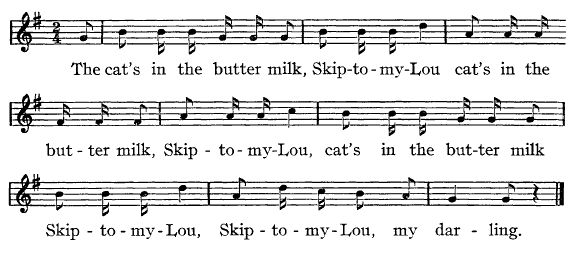
Flies in the sugarbowl, skip to my Lou; (three times)
Skip to my Lou, my darling.
Mama churns the butter in Grandpa's boot; (three times)
Skip to my Lou, my darling.
Mice in the cream jar, what'll I do; (three times)
Skip to my Lou, my darling.
Mule's in the cellar, kicking up through; (three times)
Skip to my Lou, my darling.
Chicken's in the haystack, shoo, shoo, shoo; (three times)
Skip to my Lou, my darling.
Gone again, what'll I do? (three times)
Skip to my Lou, my darling.
I'll get another one better than you; (three times)
Skip to my Lou, my darling.
Pretty as a blackbird, and prettier too; (three times)
Skip to my Lou, my darling.
If I can't get a blackbird, a white bird'll do; (three times)
Skip to my Lou, my darling.
Little red wagon, painted blue; (three times)
Skip to my Lou, my darling.
Hair in the biscuit, two by two (three times)
Skip to my Lou, my darling.
When I go courting I take two; (three times)
Skip to my Lou, my darling.
The following is a play party which was undoubtedly more fun than any of the others. "Water, Water, Wine-Flower" is an almost interminable game, but with the parties set for an all-night session as they were not so long ago in Idaho, there was no shortage of time. Everybody played, and everybody enjoyed it. This play-party begins with a ring composed of girls only, holding hands and dancing to the right. As each girl is named she turns her back and continues in the ring until her partner is "at the door with his hat in his hand", upon which they join hands and march around the inner ring until enough couples are formed to make the outer ring complete. At the beginning there is a ring of girls and at the end of the game there is but one ring also, but it is composed of couples, the outer ring having gradually grown at the expence of the inner ring.
There are six verses and they go as follows:
I. Water, water, wine-flower
Growing up so high,
We are all young ladies,
And we are sure to die.
2. And specially Sarah Jane (name of any girl in the ring)
Who's the fairest in the game
So fie, fie, fie for shame,
Turn your back and tell your fellow's name. (Sarah names Walter Black, say.)
3. Walter Black is a nice young man,
He comes to the door with his hat in his hand,
He knocks at the door and he twirls at the pin,
For tomorrow, tomorrow, the wedding begins.
4. He asks if Sarah Jane is in,
She's neither in, she's neither out,
She's up in the garden walking about,
When she comes down we will sing,
For tomorrow, tomorrow, the wedding begins.
5. She comes in all dressed in silk,
With a rose in her bosom as white as milk,
He takes off his glove and shows his ring
And tomorrow, tomorrow, the wedding begins.
6. Doctor, doctor, can you tell
What will make poor Sarah well?
She is sick, and like to die
And that will make poor Walter cry.
Forty years ago, as today, the play parties were a flourishing institution in Northern Idaho, and differed but little from the games of today. The play parties then were of necessity held in homes and not in school houses: they were all night affairs, and not merely three hour parties. There were sound reasons why this should be so. The crowds were pulled over greater distances than today, and horses, not motors, furnished the power to climb the steep Palouse hills; the horses, then, needed rest, and the drivers recreation. The greater difficulties in the way of social gatherings at that time made it advisable to get the very utmost of pleasure out of each hard-earned evening. Moreover, chore time came at six or seven in the morning regardless of the fact that bedtime might have come but a few hours earlier. For these reasons, then, it was customary to prolong the play party from chore time to chore time, so that when the stock was attended to, the family might retire for the greater part of the winter's day.
For another difference, the play party of the eighties had no cook wagon from which dishes might be borrowed, and no hostess ever had enough to go around. It was too risky to borrow, for the chances were that most of the dishes would be broken on the rough ride to or from the party. On this account the couples shared a plate and had it refilled more frequently if necessary. This worked very nicely, but the shared cup of coffee presented difficulties. As often as not one member wished her coffee with no sugar, and lots of cream, while the other wished his with lots of sugar and no cream. This seems to have been a constant annoyance, and even today Father loves to rehearse how many times he had to drink his coffee at a play party as Mother seasoned it, regardless of his preferences. Often in telling of past grievances he will take an extra cup of coffee at the play party of today just to assert his independence.
Truly this was a serious flaw in the party of the past. Another difference between the play party of yesterday and that of today is found in the fact that those pioneers did not consider clothes the important factor that they have become today. Those who had fine things wore them, but those who had not did not stay home to weep. Instead, they attended the party in mother-hubbard and overalls and thought little of it. The first play party memory of one woman I know centers around the clever way in which she saved her ten-year old self from a violent death in a mad play party game, by hanging desperately to the overall buttons around the waist of the young giant who was her partner. The last difference between the play party of forty years ago and that of today is found in the fact that games which were most popular then are missing from the play party of today, and have become definitely children's games to be played on the school grounds at recess. Among these old games which are now missing from the grown-up parties are Water Merino Tansy, Little Sally Rosser, Farmer in the Dell, Thus the Farmer Sows his Seed, Polly Put the Kettle On, Here we Go Round the Mulberry Bush, and London Bridge. Still other old play party games survive today only as songs, and these largely fragmentary. Among these are Pop Goes The Weasel, Billy Boy, Old Dan Tucker, Dem Golden
Slippers and Goodbye Liza Jane. Forty years ago these were all popular at play parties. Here is Pop Goes the Weasel:

[1. It's all a-round the A-merican flag, it's all around the ea - gle,
That's the way the mo - ney goes, Pop goes the wea - sel.]
2. A nickle for a spool of thread
A penny for a needle,
That's the way the money goes,
Pop goes the weasel.
3. You can buy the baby's clothes
And I will buy his cradle,
That's the way the money goes,
Pop goes the weasel.
4. All around the farmer's house
The monkey chased the weasel,
Preacher kissed the farmer's wife,
Pop goes the weasel.
The play party grows in merriment as the evening passes, and a little before twelve it will probably reach its height, but about this time it becomes aware that it is unable to compete with a worthy opponent that has entered the room. This enemy makes itself known by the clatter of dishes, and the discovery that the elder women are systematically arranging a long series of high-heaped plates in that order which long experience has proved was most satisfactory for the coming onslaught.
An all pervasive odor of boiling coffee makes itself manifest, and slowly the young people discover that their elders and their youngers have all left the play party to join the side of the opposing forces. The love affairs of the district are always disclosed by the fact that it takes those participating in them about three games to realize that all the rest of the crowd is otherwise engaged. When parents see a son or daughter taking part in this small ring so blissfully unconscious of the impending feast, they realize at once that all is over but the charivari. Dad begins immediately to figure whether he will have to give up Meg and Dolly, his best milkers, or whether he will be able to square his debt to Son by turning over old Pet and the young stock; and Mother at once begins to figure on new table cloths and linens, realizing with a pang, that now she has finally accumulated enough extra bedding to secure her freedom from this kind of sewing, she must now part with it all, along with the grandmother silver spoons, and the prized Aunt Myra plates. The young people dance on blithely unaware of the furor they are causing in parental bosoms.
As the odor of coffee and salads grows, however, even these couples manifest an accumulating uneasiness, and eventually the play party ends, a little sullenly and resentfully, perhaps, but still it ends. The young people agree that they will eat, yes (pretending to the last that they are forced to it by others), but that they fully intend to resume the games immediately supper is over. Why, the evening has only begun! The idea of quitting this early! It really is unheard of! Do you think that any of the parents there agree that it is ridiculous to stop so early, and relate the hours of the play parties that they knew back in the eighties, and ninties, and the nineteen hundreds ? No, indeed. They look quietly on the storm, with perhaps a smile of amusement over the follies of youngsters in general, and forget entirely that things were once better arranged. And so little by little, between protests as it were, the young couples manage to edge slowly but craftily into advantageous places about the laden tables, and while they are thus engaged the fathers of the district will cannily begin restoring the seats, and replacing the organ against the needs of the coming Monday morning. And so the play party dies, albeit unwillingly, and each member of the crowd will in time find himself supplied with a well stocked plate and a cup of coffee - a tin cup of coffee, which means that the coffee is no hotter than the cup which he must juggle safely through the milling crowd to the refuge of his small son's seat, into which he must carefully fold himself. This feat would be totally impossible of achievement to any but the steel nerved farmer, who can manage it repeatedly with surprising agility.
The crowd attacks the supper with a contented sigh, and for a time there is little of conversation. The school children edge craftily about between bites, busily engaged in storing a supply of cake and sandwiches into certain well known desks, in anticipation of the hunger of Monday morning recess, and the young people endeavor to persuade the teacher to give another "school entertainment" at the earliest possible date. After the plates have been refilled a time or two, conversation will be resumed and will become more or less general. The short-comings of all will be rehearsed, and the play's jokes retold with sundry additions and improvements. The young couples who made the ring for the final games will come in for much good-natured bantering, and when this begins to pall, all the horse trades of the past years will be retold with the keenest enjoyment.
The mothers will now begin to pick up, by which they mean the process of collecting all the jars, and bowls, and cake-plates, and leftover sections of cake, and restoring them to their proper baskets. The basket, when it is repacked, is given to Dad to carry out to the car, mother never failing to remark at this stage, that she knows perfectly wellif she doesn't send Robert along to watch him like a hawk every single minute he will be absolutely sure to put the basket in the wrong car, or set it on the running board and later manage to drive neatly right out from under it, or put it on the ground and let every car there run over it most likely - like a man always will. With this cynicism she will pick her baby out from among a dozen or more without an instant's hesitation, and proceed to bundle it well for the ride home, the while assisting the school children on with their coats, and giving Mrs. Johnson the recipe for her cake.
It is at this stage that the amount of confusion makes it seem impossible to believe that the school house will ever achieve order again; coats, hats, vanity cases, dishes, crumbs, and fragments will be everywhere. Several women will be madly doing dishes and piling them in orderly stacks for the return to the cook-house. Children will salvage the extra supplies and attend to their concealment under the name of "clearing up". The young people show their desire to be helpful by taking themselves out to the various cars to await the redistribution that is always necessary just before starting for home. For the most part the crowd has come in family groups and it will return in the same arrangement; the only exceptions are the couples who are definitely known to be engaged, and the young people from town.
The fathers will promise to help the children find and don all their outer garments, but will inevitably desert the task to gather around the doorstep and smoke while discussing prospective crops and prices. The road and telephoneline work, which must be done before the snows set in, will be planned in detail, and the farmers who "trade work" will take this opportunity for arranging definite schedules, as will those who own machinery in partnership.
Within the school house the mothers will gradually bring order out of chaos. The wraps will be carefully sorted and distributed. The last dish will be dried and placed in its proper stack, and the wet dish towels will be wrapped in paper and returned to coat pockets. The various costumes that appeared in the play will be packed away, and the last crumb brushed up. The room, little by little, is cleared and emptied, and one by one the lamps go out. There is always a last flurry around the cars which are artistically arranged about the hitching -racks, the biggest of Cadillacs chummily nudging the most disreputable of Fords. Then with a good deal of calling last words back and forth, the premises are definitely deserted. The play party has come to an end.